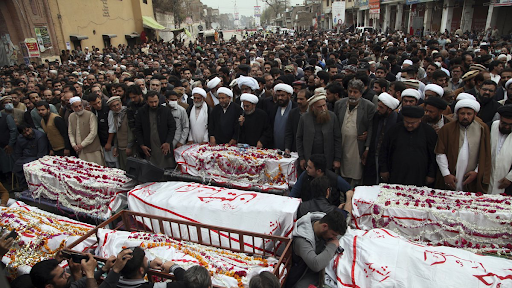ISIS Targets Another Shia Mosque in Pakistan
Pakistani civilians gather at a funeral for the victims of the bomb blast. Photo: AP Photo/Muhammas Sajjad
Last Friday, terror struck Pakistan when 63 people were killed and 200 others wounded from a bomb blast inside a Shia mosque in the city of Peshawar. ISIS-K, an affiliate of ISIS, claimed responsibility for the attack, causing fear and panic across the nation.
The Islamic State of Iraq and Syria, most commonly known as “ISIS”, is an extremist Sunni jihadist group that has a history of targeting the Shia community, as well as other branches of Islam outside of the Sunni sect.
Tensions between Sunni Muslims and Shia Muslims have existed for centuries, largely due to their different approaches to practicing Islam. While Pakistan is home to several religions, Islam is the dominant one, with 96.4% of the population identifying themselves as Muslim. Around 80-85% of Pakistanis are Sunni Muslims while the remainder are either Shia Muslims or associate themselves with another group within Islam. Although these categories of Muslims in Pakistan are generally tolerant of each other, there have been prior acts of violence against the Shia community from previous extremist, Islamic terrorist groups. In 2021 alone, there were two major terrorist attacks against Shia Muslims in Pakistan. Three people were killed and 50 others suffered injuries from a bomb blast in central Pakistan, while in southwest Pakistan, a gunman abducted and killed 11 Shia Muslims.
Terrorist organizations have brutalized Pakistan and its neighbor, Afghanistan, for years. Suicide bombing has been a common occurrence, especially in densely populated regions, frequently killing thousands of civilians.
In 2015, The National Action Plan (NAP) was launched by former Pakistani Prime Minister Nawaz Sharif to combat terrorism and extremist ideology after negotiations with militant organizations failed. The plan was launched following the Peshawar school massacre, one of the deadliest assaults in Pakistani history, which claimed the lives of around 141 individuals, most of whom were schoolchildren. Since NAP’s establishment, Pakistan had managed to prevent and eliminate terrorist activities originating from within and outside the country until the steady resurgence of the Taliban following their invasion of Afghanistan.
Security forces analyze the mosque after the blast. Photo: CNN
As Peshawar mourns the loss of life and destruction, security forces have been swift to collect data on the assailant. ISIS-K had falsely identified the attacker as Julaibeed al-Kabuli. However, security officials have revealed the individual’s real name as Muhammad Ali Saif, an Afghan immigrant who migrated to Pakistan with his family decades ago and had returned to Afghanistan to become a member of ISIS. His parents had informed the police of his intentions to join the militant group.
A spokesperson for the Pakistani Prime Minister Imran Khan said he “condemned the attack.” Khan took to Twitter to write, “My deepest condolences go to the victims' families & prayers for the recovery of the injured. I have asked CM KP to personally visit the families & look after their needs.”
Later, Khan assured the public that there would be “zero tolerance” for terrorists. He held a meeting with the National Action Plan Committee to further discuss the incident and reassured the nation that there would be immediate steps taken to ensure persecution of the terrorist organizations and measures that would protect the public from militant attacks.


